One of the first things I learned in college was a tip from a drawing/animation professor, who advised, in regard to exaggerating poses, to "push it as far as you can, then push it some more, push it just a little further, then take a break, take a walk, get a drink of water, come back and push it a little more." Implicit in this advice was that you were very unlikely to "overdo it" and in practice it was completely true - I almost always erred on the side of stiffness, and when the drawings did break, it wasn't because they were over-exaggerated, it was that the practice of over-exaggerating highlighted the gaps in my understandings of anatomy, construction, and the like. It's a pretty crazy feeling when you try your best to push something too far and yet it ends up being exactly the right amount of "pushed." This happened all the time.
Also helpful in my learning to push drawings were the leading examples of the rare artist who could push a pose or expression well beyond any of their contemporaries. John K is the classic example, real animation nerds know Rod Scribner or Jim Tyer, and REAL animation nerds know this shit. I have a great appreciation for these guys - the people who extend beyond precedent and set the bar for what is possible, just barely palatable to the artists and just barely comprehensible to the layman. I might never be as bold and adventurous as they were, but seeing very extreme examples of cartoon exaggeration showed me just how far I was from the upper-limit, and gave me a better sense of the space of possibilities.
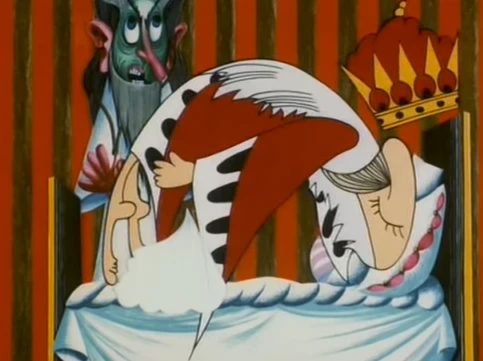
If it wasn't obvious, this advice extends to more than just drawing for animation. Pushing yourself uncomfortably far in any endeavor is a great help in realizing the parameters and boundaries of the space you're working in. I've often given the advice to people who do design work (a kind of work that lends itself to obsessively tweaking little details for hours on end), to always overdo whatever tweak or change you're trying to make (if you think there's a mistake, make the opposite mistake) instead of slowly inching your way toward the correct thing in tiny increments. Sort of like jumping into a pool, or ripping off a band-aid, or fixing a bent spring by bending it the other direction instead of holding it in the correct position till it gets the idea. Like pushing poses, trying your best to overdo it has an amazing way of getting you to exactly where you need to be.
I grew up in a time when "Low Arts" like comics and TV and video games were getting a sort of cultural reappraisal - people saying "yes, these too can be art," in spite of their association with infantilism and children's mind-rot. Even though those tides were shifting, remnants of the old sentiment - that the low arts were a sort of pornography incapable of deeper meaning - lingered, and even in underground circles it was extremely unfashionable to be caught taking yourself too seriously. But even though many works of the time were soaked in cynicism and an "it's uncool to care or try" attitude, it's impossible to deny that we were making things that were intended to have some impact on people. After all, if I wasn't trying to affect any change on the external world, why was I making anything at all? Even if the point of a cartoon was just to be a cheap laugh - something that makes you smile for five seconds before you move on, wasn't that too an expression of the way I wanted the world to be?
So for those of you who may have been raised, like me, on the idea that "trying is lame," but have always had the nagging feeling that maybe you actually do have something to say, and that you are only being restrained by the need not to expose your hubris - the ego-driven desire to keep itself concealed - I encourage you to push, push more, take a walk, eat dinner, have a smoke, come back, and push further still.
Caveh Zahedi - 365 Stories I want to tell you before we both die (2021)
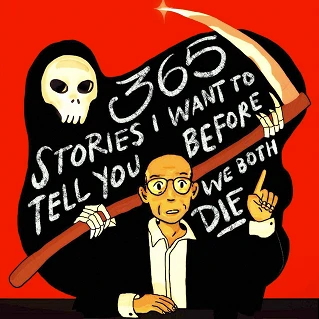
Caveh has become one of my favorite examples of someone who lives and dies by his ideals, and seems to take pleasure in suffering for his art. One of his ongoing projects was called this before it became too self-destructive and he chickened out. 365 Stories was a project he published over the course of 2021 and my favorite thing he's done, but for the purposes of this blog post I just want you to listen to this episode:
- Ecstasy at Rotterdam (3 minutes)
The film he mentions in the story is also very good - in it he tries to "prove the existence of god," while also attempting the equally herculean task of connecting with a somewhat estranged father and half-brother, all while being repeatedly frustrated by constant technical problems with the film equipment. [Spoiler]
There's a moment in the movie where they sort of tease "something interesting is going to happen in one hour" and there's a real tension to whether or not they will actually get the interesting thing on film. And when the interesting thing comes, they *do* fuck up in a really spectacular way that, for me, is the shining moment of the film.
I'm awed by the audacity of saying "I was trying to make the greatest film ever made," and am humbled by his admission of absurdly high aspirations. If you've read some other posts I've written, you may have gathered that I, too, have absurdly high aspirations that I'm sometimes ashamed to admit to. Like Caveh in the story, it's more often in moments of elation that I get big pie-in-the-sky ambitions about things, but to acknowledge publicly that you get those feelings at all - those feelings most commonly associated with egotism and narcissism, or of thinking you have it within you to make something of godly importance, takes a sort of confidence that is pretty rare, even in real-live narcissists and egotists.
This however is not the upper-boundary of high ambitions.
Brian Moriarty - The Point Is (1996)

This is like fifty minutes long so I don't expect you to listen to the full thing now, but if my writeup piques your interest, I do recommend it! (Also, you may have heard a sample of it already, if you made it to track two of my album)
At the dawn of the world wide web, Brian Moriarty had a vision that the internet was more than a means of getting information to people - that the internet was a stepping stone to some kind of ascension to a higher plane, where human consciousness is not bound by physicality or transitory skeuomorphism. He didn't claim to know what this higher-order thing was - only asking that you indulge in the fantasy that such a thing might exist, and that it may be time to find it.
I don't necessarily agree with his vision, but parts of it seem to be true already - the internet has a strange power to catch you in a brooding/antisocial mood, and coax you into exposing sides of yourself that you would never reveal in polite society. From that, some people will conclude from that that the internet-you is the "real" you, or perhaps that the real-you is the "real" you. But I think that both yous are real, and the internet is now making us all reckon with a new, more detailed, somewhat ugly and somewhat beautiful picture of human consciousness. "The Point Is", in that way, is a vague envisioning of what the natural conclusion of such a shift in perception of ourselves and others might look like. Speaking of which -
Serial Experiments Lain (1998)
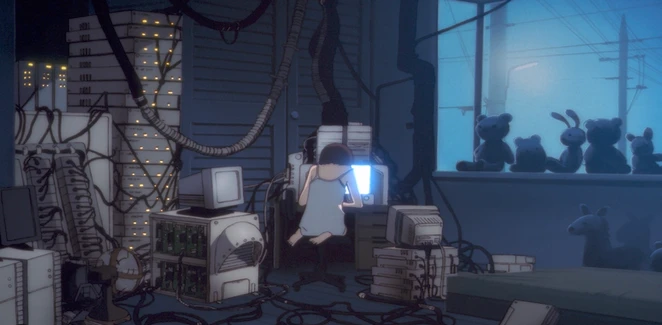
The thing that made me want to write this blog post in the first place was watching Lain for the first time (it kicks ass, I would call it a "must watch"), and then reading this excerpt about it on Wikipedia:
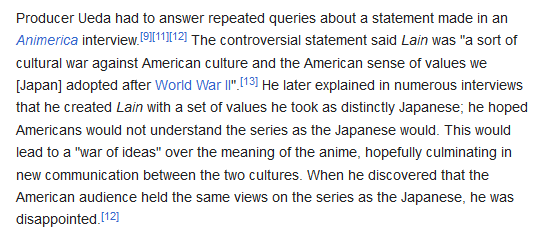
Later I went back and read the full interview, and the intention was actually not quite as insanely ambitious as Wikipedia makes it sound - he wasn't hoping to invoke some all-encompassing culture war, just a sort of localized debate between Japanese and American fans that would help them to understand each others' cultures, and what insights they could gain from one another. Still a very ambitious goal, albeit not biblical in scale.
If you've seen Lain and were interested in what it had to say, it's probably worth checking out The Point Is, and vice versa. If you thought The Matrix was deep and interesting, then put away the baby's toys and watch Lain right now. I'm generally a subs guy but I watched the dub at a friend's recommendation and I can't imagine enjoying the sub more, so make of that what you will.
It's good and you should watch it! But don't take my word for it, take his!
Jonathan Blow - Preventing the Collapse of Civilization (2019)
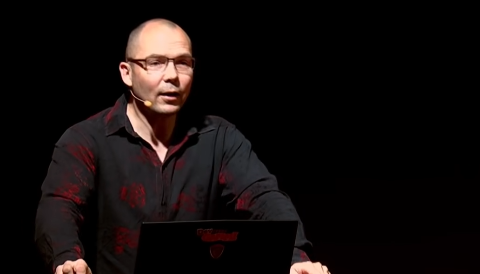
Jon Blow, director of hit indie games Braid and The Witness (and a friend of Brian Moriarty!), gave a lecture at a gamedev conference a few years ago, and among some thoughts tangentially related to game design, detailed a vivid picture of how the current failures of the software industry might be the first warning signs of an impending large-scale civilizational collapse. If that sounds crazy, I recommend you watch it, and you can assess for yourself how realistic any of it sounds. Lacking in any kind of world history knowledge, I was surprised to learn that civilizations have already collapsed many times throughout history, and was intrigued by the notion that institutional decay can happen so slowly (hundreds of years) that a collapse may be imperceptible from the inside.
In the years since watching this I've become a lot grumpier about software being buggy and perpetually half-baked, so if you don't want to become a preachy evangelist for another big looming problem, you might want to skip this one. On the other hand, if you DO want to get mad about Windows being horseshit or annoy all your friends with doomsday rhetoric, check this shit out, too.
I have a great deal of respect for the creators who are willing to take on the throes of people primed and ready to call them 'pretentious,' 'egomaniacal,' or 'wrong,' and will say things they feel strongly about with total disregard for the "optics" of doing such a thing. It's something I tried to do while writing this very post, and I couldn't help but squirm writing sentences like "This however is not the upper-boundary of high ambitions." I guess it takes a long time to unlearn the 'never take yourself too seriously' thing. Walking the line between impactful and overdramatic is also hard; something I tell myself is that the difference between the stuff-that-tries-to-be-deep-but-sucks and stuff-that-tries-to-be-deep-and-works is often a matter of "sticking the landing," so to speak. Attempting serious work doesn't mean you have to relinquish your sense of humor, or take on a weird somber tone all the time, just that you have to think hard about the thing you're trying to say and the best means of saying it.
I have never attempted to do work at the level of ambition I've been describing, but I might, someday. If you ever do, here are some things I've noticed these works have in common, for your consideration:
- A willingness to be "not for everyone"
- A willingness to be slow and long
- Use of surreal aesthetic choices to complement the message, and put the audience in a headspace where they might be more receptive of a radically new way of thinking
- A willingness to leave details vague and open to interpretation, in instances where you yourself can't grasp the entirety of what you're getting at
- An openness to the possibility that individuals can affect great change, and that you could be one of those individuals, and it's okay if you're not or if you're wrong, because people will not hear important ideas unless the people who have important ideas are willing to say them, and we have undoubtedly already lost important ideas to self-doubt and the fear of sounding a little too self-important
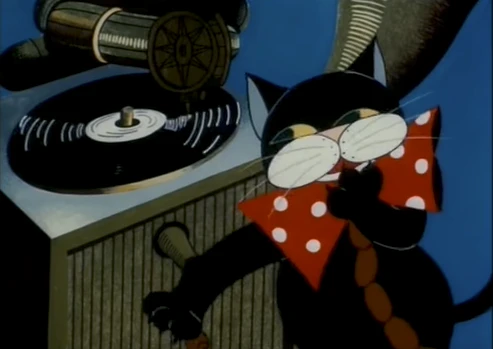
Emrox
This was conceived as a sort of sequel to this post I made about Canadian animation. If you like my writing about art I like, go read that, too! https://emrox.newgrounds.com/news/post/1337581